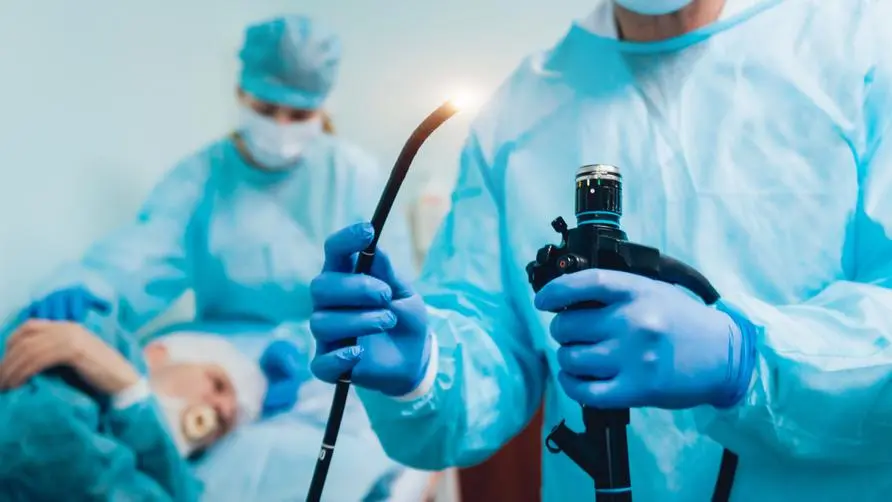Don't give up on treatment for advanced colorectal cancer! Benefits of dual therapy "target + chemotherapy": It is expected to "completely eliminate" cancer cells

Colorectal cancer has been on the list of the “Top Ten Cancers” for several years. In recent years, Taiwanese people have Westernized diets, popular hand-shaken drinks, and are accustomed to a diet of big fish, meat, and high sugar and oil. By the time symptoms appear, it may have already progressed to an advanced stage. Dr. Chen Zhirong, the attending physician at the Colorectal Surgery Department of New Taipei City Tucheng Hospital, was interviewed and called on cancer patients to make good use of genetic testing and actively follow the doctor’s instructions to take medication regularly to improve their own survival benefits.
Are the symptoms of colorectal cancer different depending on where it occurs? Are the symptoms easily confused with hemorrhoids and diarrhea?
Colorectal cancer may have different symptoms depending on its location. Dr. Chen Zhirong explained that the precursor of colorectal cancer is “colon polyps”. There are no obvious symptoms before cancer occurs. Until the tumor continues to grow and reaches an advanced stage, the symptoms will differ depending on the location of the growth. For example, if it occurs on the left side of the large intestine (descending colon, sigmoid colon or rectum), it is prone to obstructive symptoms such as abdominal pain, bloody stools, changes in bowel habits (diarrhea, constipation), etc.
If the tumor grows in the right large intestine (the intersection of the cecum and the small intestine), it can easily lead to chronic bleeding in the intestine, leading to symptoms such as melena and anemia; and because of its larger diameter, it is less likely to cause obstruction and abdominal pain symptoms are less likely to occur. obvious. Dr. Chen Zhirong reminded that the symptoms of colorectal cancer are not typical and can easily be confused with hemorrhoids, diarrhea and other conditions. If the above situation persists for weeks or even months, you should be alert and schedule an examination as soon as possible.
Are 20% of patients already in advanced stage when they seek treatment? Can surgery still be performed in the fourth stage?
Dr. Chen Zhirong explained that because the early symptoms of colorectal cancer are not obvious, clinical observations have found that about 10-20% of cancer patients are already in the advanced stage when they develop obvious symptoms and seek medical examination. However, in recent years, the government has promoted free colorectal cancer screening for people over 50 years old, and many patients whose tumors are still in the stage of carcinoma in situ (stage 0) have been diagnosed. They only need to remove the tumors through colonoscopy or simple surgery. Generally, they will Have a good survival rate.
On the contrary, if the malignant tumor has invaded other organs or even metastasized far away (stage 4), the mainstream treatment in recent years has been compound therapy, such as chemotherapy combined with targeted drugs, with the main goal of controlling or shrinking the tumor. It is found that good treatment results can be achieved; some patients may still have the opportunity to undergo surgery despite drug treatment, which is expected to further prolong their survival.
Does advanced colorectal cancer require genetic testing? 3 major items that must be tested by medical experts
In recent years, cancer treatment has emphasized personalization and precision. Dr. Chen Zhirong said that the treatment guidelines for advanced or metastatic colorectal cancer are based on the results of “tumor gene testing” to formulate treatment strategies for chemotherapy and targeted drugs; clinically, two RAS will be tested. Genes: KRAS and NRAS are used as the basis for selecting target drugs. For example, for colorectal cancer that occurs on the left side and does not carry RAS gene mutations, studies have found that the first line of treatment is to use chemotherapy combined with epidermal growth factor receptor (EGFR) single strain. Antibody-targeted drugs have better therapeutic effects than chemotherapy alone.
In addition, the clinical characteristics of colorectal cancer with BRAF gene mutations are that they are more likely to occur in the right large intestine. Microscopically, they are prone to mucus secretion, poor differentiation, more advanced stages, and prone to peritoneal metastasis. Dr. Chen Zhirong pointed out that “next generation genetic sequencing” (NGS) for cancer treatment, starting from May 1 this year, health insurance will cover colorectal cancer single gene testing, which is expected to benefit patients with advanced colorectal cancer.
Target + chemotherapy extends patient survival! Tumor shrinkage is expected to lead to “complete cure”
In order to achieve the expected treatment effect for advanced colorectal cancer, whether surgery is possible is often the key to the survival rate of cancer patients. Dr. Chen Zhirong said that most stage 0 to stage 3 colorectal cancers can achieve good results after surgical treatment. If patients in stage 4 are assessed to be unable to undergo surgery, priority will be given to interventional targets and chemotherapy drugs to shrink the tumors. Symptoms caused by compression of organs, such as compression of the lungs causing difficulty breathing, compression of the liver causing jaundice, etc., can also be greatly improved.
“In the past, treatment options for late-stage colorectal cancer were limited, and the survival rate was often unsatisfactory. Nowadays, combined therapies allow late-stage cancer to no longer be equated with ’terminal’. Targeted chemotherapy drugs are expected to extend patient survival.” It progresses from about 10 months to 20 months or even more than 30 months. Not only that, the shrinkage of the tumor can improve the success rate of minimally invasive surgery, and the treatment response rate can reach more than 70% if the tumor can be completely eliminated. The opportunity to achieve “complete cure”!"
Cancer cells metastasize from the large intestine to the liver! He takes medication regularly and “has not relapsed in 10 years”
Dr. Chen Zhirong pointed out that 10 years ago, a 51-year-old man was admitted to the hospital. His sigmoid colon had obvious obstruction, and the tumor had metastasized to the liver. Since the tumor was deep and close to major blood vessels, direct surgery was not possible. Fortunately, after receiving targeted and chemotherapy drug treatment, the doctor originally assessed that laparotomy was needed, and the liver tumor had indeed shrunk. After two minimally invasive surgeries, the patient’s condition became stable, and there is still no recurrence in regular follow-up.
If it cannot be improved through surgery afterwards, can continued medication control tumor growth? Dr. Chen Zhirong emphasized that for patients with advanced colorectal cancer who cannot undergo surgery, continued medication can still help control the disease. “There was once a young female patient whose cancer cells had metastasized to many lymph nodes throughout her body. Surgery could not completely remove the tumor in her body, but She continued to take medication regularly afterwards, and her condition is now under stable control, and her life is no different from ordinary people.”
Is colorectal cancer no longer exclusive to the elderly? Group 1 should consider screening at the age of 35
Dr. Chen Zhirong said that even though the treatment of colorectal cancer has improved, the public still needs to develop basic cancer prevention awareness. Cancer cells are not developed overnight, but are accumulated over a long period of bad habits, especially those of modern people such as sitting for long periods of time and eating a Westernized diet. Colorectal cancer is no longer exclusive to the elderly, and there are many 30-40 year olds in the clinic. of young patients. Therefore, developing correct living habits and regular screening at an early age can be said to be essential lessons for preventing colorectal cancer.
Dr. Chen Zhirong suggested that due to the trend of younger people with colorectal cancer, it is recommended that people around the age of 40 have their first colonoscopy. For low-risk groups, they can have the examination once every 5 years, and for high-risk groups, it is recommended that every 1- Have a routine checkup every 2 years. In addition, those with a family history of colorectal cancer can actively start receiving colonoscopy examinations as early as 35 years old, and young people aged 20-30 should receive routine health examinations on a regular basis.
Since colorectal cancer mostly occurs in middle-aged and elderly people after the age of 50, the Taiwan Health Promotion Administration subsidizes quantitative immunoassay fecal occult blood tests every two years for people aged 50-74, and people should take advantage of this. Dr. Chen Zhirong emphasized that if colorectal polyps or even tumors with metastasis are detected, there is no need to worry too much. You should follow the doctor’s instructions and take medication as soon as possible. Even if the disease has progressed to an advanced stage, there is still a chance to be completely cured and return to normal life.
TWN-954-0624-80003
This health education information is provided with the assistance of Taiwan Amgen
Extended reading:





